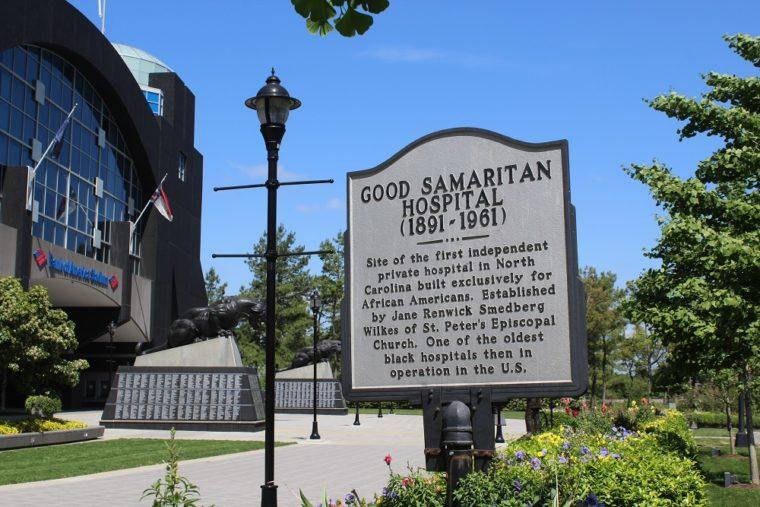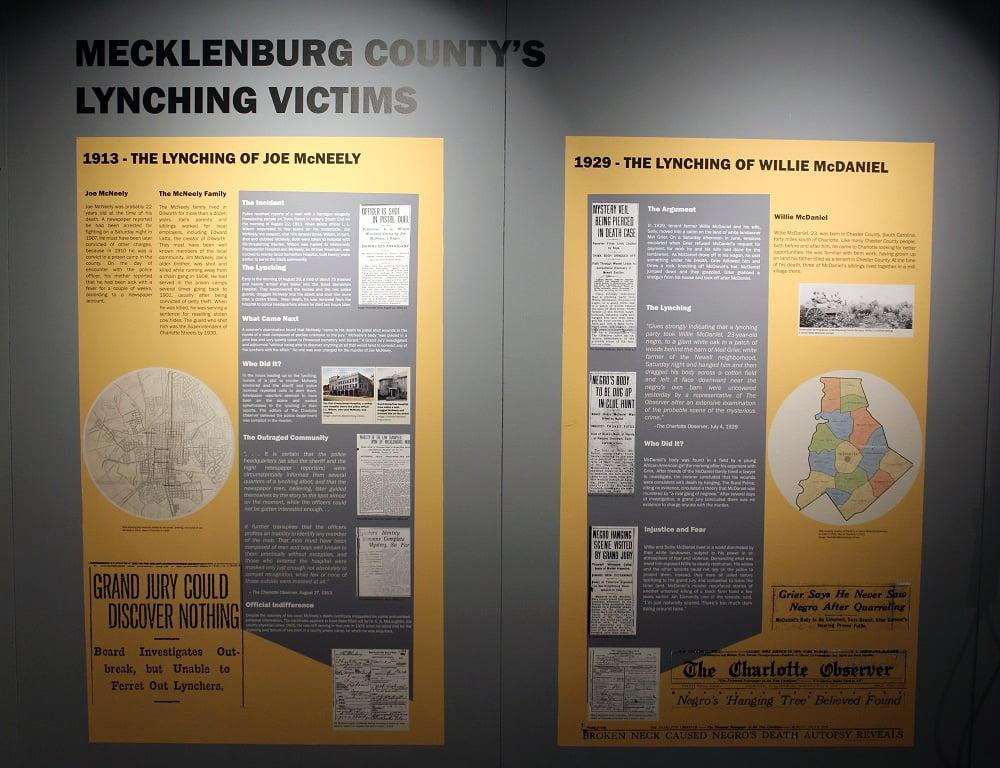Levine Museum of the New South’s “Legacy of Lynching: Confronting Racial Terror in America” Exhibit
by Bernie Petit, Communications Manager 06/03/2019Why This Matters: The Levine Museum of the New South’s new exhibition “The Legacy of Lynching” asks Charlotte-Mecklenburg to confront an ugly part of its past in order to better understand its present.

The first documented lynching in Charlotte-Mecklenburg occurred in August, 1913 at Good Samaritan Hospital, where Bank of America Stadium – home of the Carolina Panthers – now stands.
A new exhibition at Levine Museum of the New South forces Charlotte-Mecklenburg to confront one of the ugliest parts of its past.
“The Legacy of Lynching: Confronting Racial Terror in America,” which opened in April and runs through July 17, presents the Equal Justice Initiative’s groundbreaking research into the history of terror lynchings, including two recorded lynchings that took place in Mecklenburg County.
The exhibition features powerful oral testimonies from descendants of lynching victims and seeks to spark conversation about the legacy of racial injustice, from slavery to present-day mass incarceration.
“If we do not understand that part of our history in the country and the community’s history in that history, we can never come to grips with some of the things we’re dealing with today,” said ASC President Robert Bush.
Levine Museum is the third institution to host the traveling exhibition, previously displayed at Brooklyn Museum in New York and Haverford College in Haverford, Penn.
Among the community events scheduled in conjunction with the exhibition is “It Happened Here: The Charlotte Remembrance Project” on May 8, an interactive dialogue about the story behind the exhibit, Mecklenburg County’s two documented lynching victims and the journey of bringing a memorial to publicly acknowledge the tragic events to Charlotte.

Documentation of the two recorded Mecklenburg County lynching victims in the Levine Museum of the New South exhibition “The Legacy of Lynching: Confronting Racial Terror in America.”
The first documented lynching in Charlotte-Mecklenburg occurred in August, 1913 where Bank of America Stadium – home of the Carolina Panthers – now stands.
There was a shootout between a white police officer and Joe McNeely. The injured officer was taken to Presbyterian Hospital; McNeely was taken to Good Samaritan Hospital, the African-American hospital once found where fans stand and cheer for the Panthers.
“Some say that a group as large as 70, another version says 30 masked men gathered around 1 [o’clock] in the morning and stormed the hospital,” Levine Museum historian Willie Griffin told WBTV. ”Drug him out of his hospital bed into the front of the hospital and they riddled him with bullets and they just disappeared.”
The other documented lynching in Mecklenburg happened in June, 1929, when Willie McDaniel – a tenant farmer – was murdered for arguing with a white landowner over nonpayment for work.
Documentation of the two recorded Mecklenburg County lynching victims in the Levine Museum of the New South exhibition “The Legacy of Lynching: Confronting Racial Terror in America.”
The two Mecklenburg lynchings are among the 4,391 that occurred between the end of Reconstruction in 1877 and 1950, as documented by the Mobile, Ala.-based Equal Justice Initiative, including 123 in North Carolina.
The exhibition asks Charlotte-Mecklenburg to face its past so that it can make sense of its present.
VIEW THE EXHIBITION
“The Legacy of Lynching: Confronting Racial Terror in America,” running now through July 17, 2019 at Levine Museum of the New South. View hours of operation and admission.
ASC Donors: Use your ASC Connect with Culture card for buy-one-get-one free admission.
Exhibit traces legacy of lynching in North Carolina through the stories of victims
The Charlotte Observer
ADDRESS + TELEPHONE
200 E. Seventh Street
Charlotte, NC 28212
704.333.1887
ADMISSIONS
New admission prices effective September 1, 2018.
-
Adults $10.00
-
Seniors (62+): $8.00
-
Students, Educators and Active Military: $8.00 (with current, valid ID)
Active military and families receive free admission from Memorial Day through Labor Day -
Children (6-18): $6.00
Ages 5 and under: FREE -
Access History: $2 (with current EBT card or WIC voucher). $10 maximum
-
Families: $30 maximum (up to 9 people)
Click here for information about our guided and unguided group tours.
Admission is 1/2 off every Sunday throughout the year.
Access History tickets must be purchased in person.
HOURS OF OPERATION
Monday – Friday: 10:00 a.m. – 5:00 p.m.
Saturday: 10 a.m. – 4 p.m.
Sunday: 12:00 p.m. – 5:00 p.m.
Please note: Last admission is 30 minutes prior to closing
DIRECTIONS
Click here for a link to Google Maps.
From I-77 South or I-85, take I-77 South to Brookshire Freeway (exit 11). Take Brookshire Freeway East / I-277 South (exit 11A). Take the Church/Tryon Street exit onto 11th Street. Turn right onto Tryon Street. Turn left onto 7th Street. The Museum is on the right, on the corner of College and 7th, with the entrance facing 7th Street.
From I-77 North, take John Belk Freeway / I-277 North (exit 9B) to the College Street exit. Take College Street (one-way) to 7th Street. Turn right onto 7th Street. The Museum is on the right, on the corner of College and 7th, with the entrance facing 7th Street.
Take the Lynx Blue Line to the Seventh Street Station.
PARKING
On weekdays, Levine Museum provides visitors 2 hours of validation for parking in the Seventh Street Station parking deck, which is located next to the Museum. After 2 hours, regular parking fees apply.
On weekends and for evening events after 5:00 p.m., the Museum provides parking validation, with no hourly limit.
Visitors should present parking ticket for validation at the Guest Services desk upon arrival.

What We Do
We serve as the designated “Office of Cultural Resources” for the City of Charlotte, Mecklenburg County and six suburban towns by providing advocacy, cultural education programs, cultural planning, fundraising, grant making, public art and workshops and trainings for the cultural community. We work to ensure Culture For All by combining resources from local and state government with those of the private sector to maximize community impact throughout the cultural sector.
We work every day to ensure access to an excellent, relevant, and sustainable cultural community for the Charlotte-Mecklenburg Region.
Resource Hub
Because strategy, standard setting and capacity building are critical components in ensuring access to a rich cultural life for all, we serve as a resource hub for arts, science, history and heritage organizations and creative individuals, enabling the Charlotte-Mecklenburg cultural community to adapt to 21st-century trends in philanthropy, demographics and citizen participation.
Lead Advocate
We advocate for the regional cultural community to build community engagement in its cultural life.
We help ensure Culture For All by investing in cultural education experiences, diverse cultural festivals, creative individuals, professional development opportunities and organizations.
Mission & Vision
Mission
Ensuring access to an excellent, relevant, and sustainable cultural community for the Charlotte-Mecklenburg Region
Vision
A vibrant cultural life for all.



